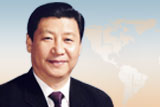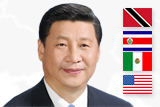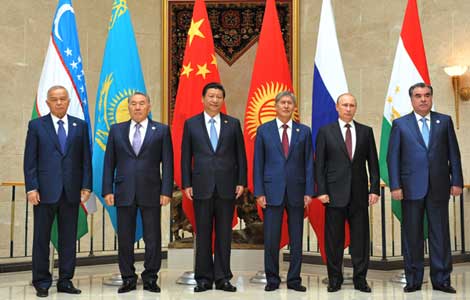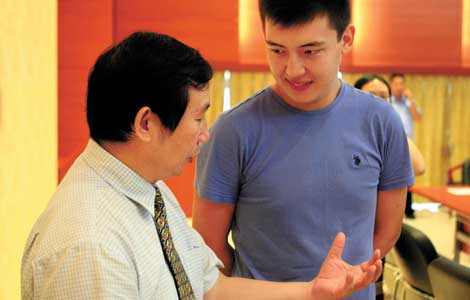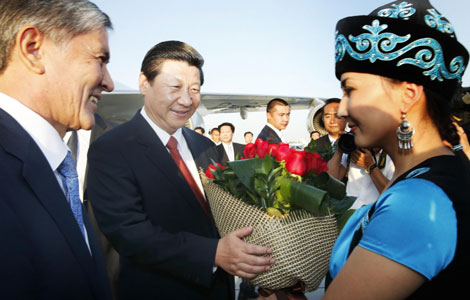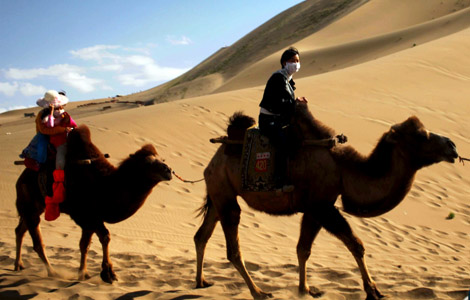
Sino-Japanese meeting at G20 ruled out
Updated: 2013-08-28 01:11
By Zhang Yunbi (China Daily)
|
|||||||||
Tokyo refuses to hold 'dialogue of substance' in resolving disputes
A senior Chinese diplomat on Tuesday criticized Japan for lack of sincerity in its latest call for a meeting between the countries' top leaders, saying Tokyo was just trying to strike a pose and mislead the public.
"A leaders' meeting is not just about shaking hands or taking pictures, but solving problems," Vice-Foreign Minister Li Baodong said at a news briefing in Beijing.
He was answering a question whether leaders of the two countries will hold talks on the sidelines of the upcoming G20 summit in St Petersburg from Sept 5 to 6.
President Xi Jinping and Japanese Prime Minister Shinzo Abe will attend the meeting, and some Japanese media have reported that Abe was seeking to hold talks with Xi during the event.
Li noted that Tokyo has long refused to engage in a "dialogue of any substance" with Beijing on resolving the Diaoyu Islands issue.
"Tokyo has always shown its tough side and remained provocative on this issue," Li said.
If Japan really wants to improve relations, it should take a step of substance, rather than use "empty words or gestures", he said.
Lu Yaodong, director of the Japanese diplomacy department of the Institute of Japanese Studies at the Chinese Academy of Social Sciences, said it was not the first time Tokyo has proposed a top leaders' meeting.
Tokyo is trying to give people an impression that it is dedicated to breaking its diplomatic deadlock with Beijing. "By doing so, Japan can then accuse China of being insincere in resolving the disputes," Lu said.
On Sept 9, 2012, former Japanese prime minister Yoshiko Noda talked to former president Hu Jintao on the sidelines of the APEC summit in Vladivostok, Russia.
But one day after their meeting, Tokyo ignored Beijing's repeated warnings, and went ahead with an announcement that Japan would "nationalize" China's Diaoyu Islands, straining already tense relations.
A top Japanese spokesman, Chief Cabinet Secretary Yoshihide Suga, has said there is no territorial dispute over the Diaoyu Islands.
On Tuesday, Japan's Coast Guard said it will purchase more ships and recruit more personnel next year to deal with China's "growing presence" in waters off the Diaoyu Islands.
And recently, some political forces in Japan have even openly denied the outcomes of World War II and blatantly challenged the postwar international order. "Under such circumstances, how can we arrange a meeting between the two leaders?" Li said.
Liu Jiangyong, an expert on Japanese studies and deputy dean of the Institute of Modern International Relations at Tsinghua University, said Japan has listed China as "a major target of its strategic deterrence".
"Japan is trying to justify its increasingly assertive military buildup" by playing up tensions over the islands, which has long worried its Asian neighbors, Liu said.
UN Secretary-General Ban Ki-moon said on Monday during a visit to Seoul that Japan needs proper awareness about history.
He urged Japanese leaders to have "very deep introspection", with particular reference to Japan's plans to revise its pacifist Constitution.
Suga on Tuesday expressed displeasure over the remarks and inferred that the UN chief did not fully understand Japan's position.
President Xi will pay official visits to Turkmenistan, Kazakhstan, Uzbekistan and Kyrgyzstan from Sept 3 to 13.
He is also scheduled to attend the 13th Meeting of the Council of Heads of the Member States of the Shanghai Cooperation Organization on Sept 13 in Bishkek, the capital of Kyrgyzstan.
A series of agreements will be signed in sectors such as oil and gas, transportation, telecommunications, investment and culture during Xi's first trip to Central Asia as president, said Vice-Foreign Minister Cheng Guoping.
Dong Manyuan, vice-president of the China Institute of International Studies, said the trip will serve as an "integral piece of the new Chinese leadership's diplomacy jigsaw" in cementing relationships with China's neighbors.
Xi will make a speech to outline China's Central Asia policy at Nazarbayev University, a leading university in Astana, the capital of Kazakhstan.
The central Asia trip is the third round of overseas visits for Xi after he took office in March. Xi traveled to Russia and Africa in his first tour, and to Latin America and the US in the second round.
Developing countries account for a majority of Chinese leaders' destinations, which highlights China's diplomatic priorities, Dong said.
Related Stories
China-Japan bilateral meeting unlikely at G20 summit 2013-08-27 16:08
Japan mulls law to back collective self-defense 2013-08-26 07:55
Japan exports to China at lowest in four years 2013-08-16 07:48
War shrine is an open invitation to Japan's extremists 2013-08-16 07:25
Schedule
